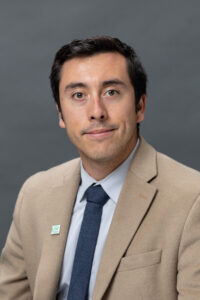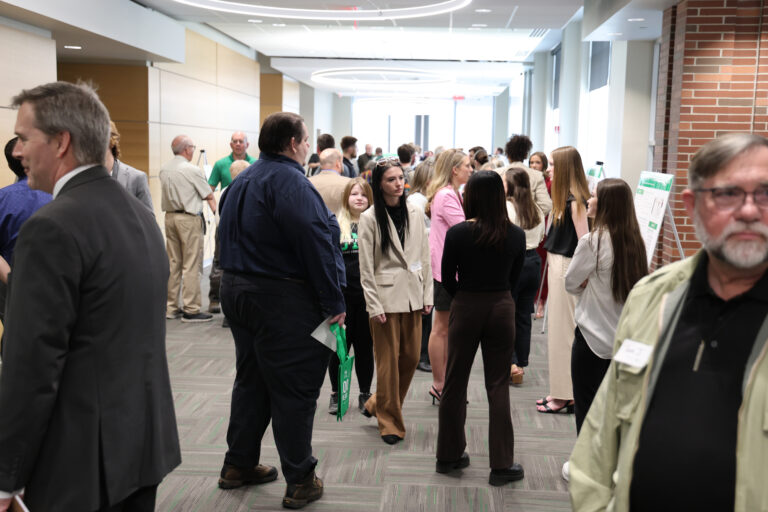Meet the Beatles
Lifelong fan Chris Gable, associate professor in UND’s Department of Music, reflects on teaching an academic seminar on the band

With a little help from an ensemble of UND music students, attendees of the third lecture of the University’s Randy Rasmussen Lecture Series came together for expert insight into one of rock’s most influential acts.
The series honors the late Rasmussen, an author, connoisseur of the arts and former employee of the Chester Fritz Library – the venue hosting the lecture series.
Chris Gable, associate professor and director of graduate studies at UND’s Department of Music, delivered the lecture on Thursday, chronicling his lifelong love and scholarship of The Beatles. He considers the band foundational to his overall interest in rock, having been introduced to their music by his older brothers.
“This is very embarrassing, but we would stand on the patio in the backyard and basically lip-sync to Beatles songs,” Gable said. “It was really funny, and we learned a lot about Beatles songs that way.”
Gable, whose academic background also lies in theory and composition, is the author of two books – The Words and Music of Sting, and The Words and Music of Sheryl Crow. He said teaching courses on the history of rock music wasn’t initially what he had planned.
“I came into teaching as a theory teacher, and that’s what I wanted to do and still do – I still write music,” he said. “The popular music thing was always a love of mine, and I wrote the books almost on the side – they weren’t part of a position or anything.
“The rock history thing kind of happened on a whim,” he continued. “I told my chair that we don’t have a rock history class and he said, ‘Why don’t you do it in the summer?’ So I did, and I just kept doing it. They eventually let me do it in the regular semester, and it has grown from there.”
The courses – designed to be taken in succession – are titled “Rock & Roll History 1: From WWII to 1975,” and “Rock & Roll History 2: From 1975 to the Present.” They are offered in the fall and spring semesters, respectively.
Gable said both courses’ popularity has since skyrocketed, with a record number of 130 students enrolling for the fall 2023 semester. Contrary to students’ preconceived notions that the course is easy, he says it encompasses a wide range of subject matter.
“It’s a really fun thing to teach, and it’s amazing how much there is to teach,” he said. “There’s still that perception out there that it’s a rock history class, so it’s fun, and that’s all it should be. There’s a lot to learn. A lot of different styles, bands and history of parts of the world that many students are not familiar with.”
Gable said that “knowledge of popular music should not be taken for granted, as it was for my generation.” That’s something he discovered firsthand when teaching his first capstone course on The Beatles, he said.
“In my choice of topic for these capstone courses, I try to fill the gaps in UND’s music curriculum – 20th century music and popular music,” Gable said. “What I discovered is, The Beatles definitely were a gap in the students’ knowledge. Most of them could not name all four Beatles. On the first day of class I gave them a questionnaire. One of the questions was to name a Beatles song, any song. Four of them could not name one – and this was a class of about 15.”

Gable spent a sizeable portion of his lecture dissecting the intricacies of the Beatles’ 1967 album “Sgt. Pepper’s Lonely Hearts Club Band,” considered monumental and a shift in the band’s musical style.
Gable ended the lecture by assessing the field of music education as a dynamic one, which he believes will benefit its graduates through enhanced technical skills and cross-cultural communication.
“I think that the music major who graduates 30 years from now, will enjoy a very different degree path than the students of today,” he said. “They will be much more connected in real time with students all over the world. They will use technology in ways we can barely imagine. They will see the past in a more holistic way and realize that the study of music is actually the study of all human music making, as it should have been all along.”
After Gable’s lecture, attendees were treated to an arrangement of Beatles songs performed by a quartet of UND graduate students. The quartet started with a rendition of The Beatles’ 1970 hit “Let it Be,” before launching into a medley of songs including “Yesterday,” “Hey Jude,” “Eleanor Rigby” and “Blackbird.”



